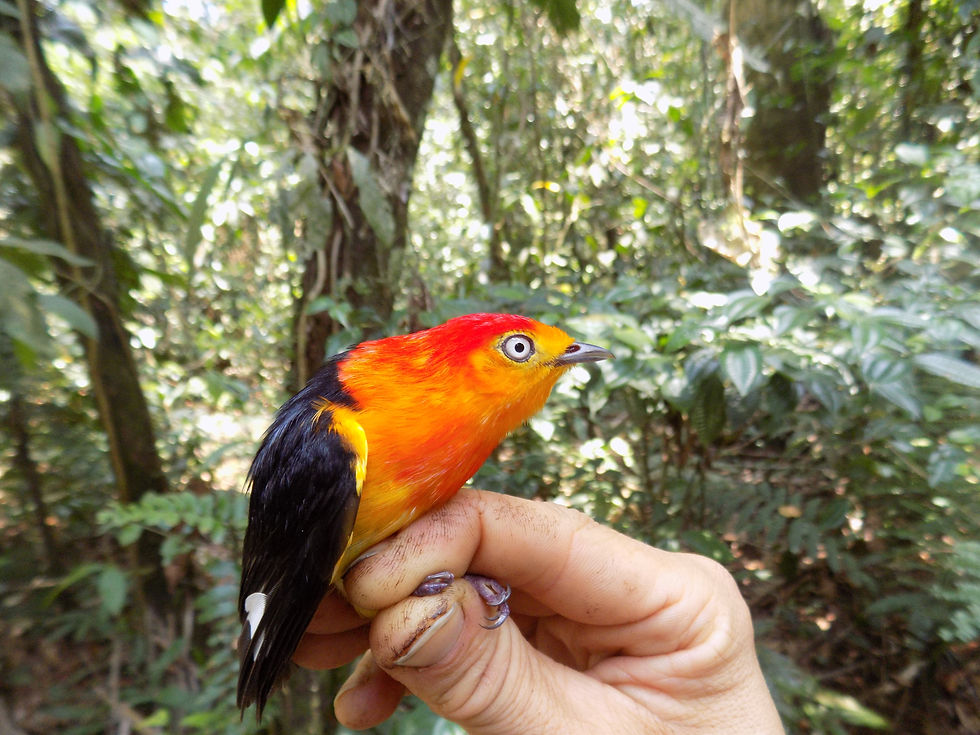A rare encounter with an all white Tui
- Micah Scholer
- Sep 21, 2020
- 3 min read
Updated: Sep 22, 2020

I am always stoked to see a bird with a few odd white feathers in its wing or tail, or perhaps a frosty patch on its head, back or breast. ‘Look, they’re special!’, I usually think to myself loudly. These birds have a genetic condition called leucism, which results in a lack of melanin produced in the feathers. Leucism is different from albinism in that the degree of whiteness can vary between individuals and only effects the feathers—albino birds lack melanin completely and are therefore uniformly white with pink eyes and other bare parts lacking color. I tend to spot leucism in more common species here in New Zealand, like Blackbirds and House Sparrows. And when I do, it’s typically only a few scattered white feathers. So, what are the odds of coming across an all white leucistic bird? The answer is surprisingly hard to find and likely varies between species. But to give you an idea, on a trip to South Georgia Island, birder Noah Strycker spotted an all white leucistic Gentoo Penguin in a colony of several million birds. Perhaps one in a million is somewhere in the ballpark then. Let’s just say it’s rare, OK?

The bird I photographed was an all white leucistic Tui. I had heard about it from a friend nearly a year ago, and even caught a glimpse of it back in December, 2019, while visiting their bach. During our visit this past month I was determined to capture a photo. Sure enough, after a couple days of leisurely waiting on the deck with my camera at the ready, I got my chance.
Leucism in Tui has been documented before, but there is only a few records of all white birds. At least one of those was a true albino, photographed in Clevedon in 2016. But it was suspected of being an all white leucistic bird because the eye did not appear red. It’s definitely albino…not only is this bird’s plumage snowy white, but its typically black legs and bill are pale because of the complete lack of melanin. The red eye would be hard to spot without having the bird in the hand. Other reports of white Tui come from Hamilton, Waikato, and Wellington. But each of these birds appear to have a separate condition that causes uniform whitening of the plumage called isabellinism. So really, they’re more like all grey Tui. A white-bodied Tui was photographed in Taumarunui during 2017 and one all white bird was documented in Opotiki back in 2007. While there are likely to be more birds that were all white that were never reported or just not photographed, Google really only points to this one bird from Opotiki as being the sole record holder.
Well, that just happens to be the same place I encountered this bird last month. Conclusion? It’s the same bird. Yes yes, I know what you’re thinking. Leucism is a genetic condition so perhaps its the offspring of the original all white Tui. Thing is, even if passed on to its chicks, leucism is likely to vary somewhat between individuals. Basically, a rare all white Tui producing another rare all white Tui is rarey unlikely. It’s more likely that this same female has been kicking around Ohiwa Harbour area now for over 13 years. While I’m not sure exactly what the maximum longevity of Tui is (you’ll have to wait to the New Zealand Bird Banding Scheme to publish their max longevity records for the entire country, which may happen soon…), I can tell you that 13 years is still shy of the record. Having evolved without many natural predators, New Zealand birds by and large chose the live long and die old strategy as opposed to those birds who invest heavily in offspring and peter out early in life. While I may not have been the first or last person to photograph this bird, I think it’s pretty neat that this individual has been around doing its Tui thing for so long. And who could blame her, Ohiwa Harbour is just a splendid little piece of paradise to settle down.







Comments